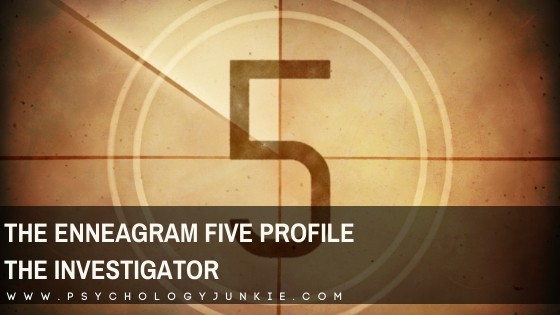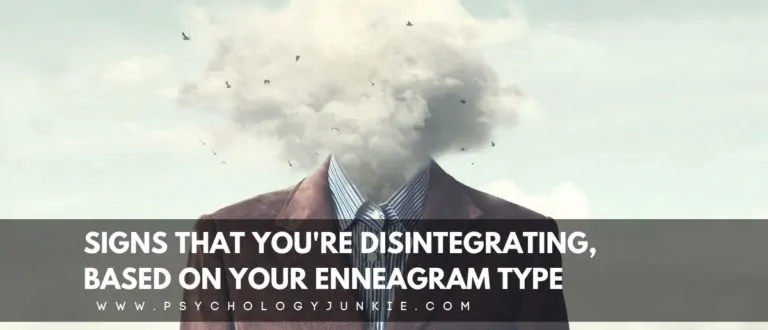The Dark Side of the Enneagram Five
If the Enneagram types were characters in a fantasy novel, Fives would be the wise sages, the reclusive wizards, the intellectual wanderers who hoard knowledge like dragons hoard gold. They’re all about understanding, analyzing, and mastering concepts that the rest of the world barely notices. But here’s the problem: their gift of deep thinking can also become a self-imposed prison.
Fives aren’t just collecting information for fun (though they do love a good research spiral). Behind their endless pursuit of knowledge is a deep-seated fear—of being incapable, overwhelmed, or helpless. So, instead of engaging with the world, they retreat into their minds, preparing for a moment when they’ll feel “ready.” But, for average to unhealthy Fives, that feeling may never come.

Not sure what your personality type is? Take our Enneagram questionnaire here!
The Root of the Five’s Struggle: Fear & Avarice
At the heart of every Five’s journey is fear and avarice—not in the “greedy corporate villain” sense, but in the deeply psychological sense of hoarding energy, knowledge, and resources.
- Basic Fear: “What if I’m not capable? What if I can’t handle the world?”
- Basic Desire: “I must be competent. I must be self-sufficient.”
To feel safe, Fives gather knowledge obsessively. They convince themselves that if they can just learn enough, prepare enough, master enough, they’ll finally be ready to engage with the world. Often they search out a niche subject that they can be the one expert on; something that no one else in their periphery is well-versed on.
The Result?
Fives withdraw from relationships, practical experiences, and even their own emotions, believing that if they just accumulate enough understanding, they’ll be secure. But it never feels like enough. Their mind becomes an endless black hole of “just one more book, just one more skill, just one more theory” before they take action.
Example: Imagine a Five who dreams of starting their own business. They devour books, take online courses, study competitors, and analyze business strategies. They convince themselves that they just need one more piece of information before they launch. Years pass. The business never starts.

Retreating from the World
Fives often feel like they’re not quite ready for real-world engagement, so instead of pushing through discomfort, they retreat into the safety of research mode. The more they retreat, the harder it becomes to return.
“Since Fives feel easily intruded upon, they learn to protect themselves by emotionally withdrawing from people.” – Don Richard Riso and Russ Hudson, The Wisdom of the Enneagram
The Cycle of Isolation:
- “I’m not ready yet.”
- Retreat into deep research mode.
- “I just need to prepare more.”
- More research, less action.
- Rinse, repeat.
The more they prepare, the less they actually do. Meanwhile, life is happening all around them—opportunities are passing, relationships are fading, and their real-world competence isn’t growing.
Example: A Five wants to learn survival skills. Instead of actually testing out their skills, they keep accumulating data, watching more YouTube videos, reading more books, and researching the best gear. One year later and they haven’t actually tried camping out in the woods yet.
Why? Because doing the thing is risky. It exposes them to failure. It forces them to feel incompetent at first. And that’s terrifying to a Five.
But here’s the paradox: knowledge without experience is just potential. It’s like collecting a library of cookbooks but never actually cooking a meal. The way out? Fives have to act before they feel ready—because the truth is, no one ever feels ready.
“Fives need to get into their bodies. Yoga, martial arts, working out, running, sports, or just a good brisk walk can all help Fives to reconnect with their physical and emotional presence.” – Don Richard Riso and Russ Hudson
The Double-Edged Sword of Expertise
At first glance, Fives’ obsession with knowledge seems like an advantage. And to be fair, it often is. They’re the deep thinkers, the visionaries, the people who can analyze a topic from every angle and see patterns others miss. Good luck trying to beat them in an argument!
But when insecurity creeps in, their knowledge-hoarding becomes less about curiosity and more about control. Instead of using their expertise as a tool to engage with the world, they start using it as a shield to protect themselves from it.
The Expertise Trap
- Fives feel safest when they’re the most informed person in the room.
- If they don’t feel competent, they retreat until they believe they are.
- The longer they retreat, the harder it becomes to interact with others normally.
- When they do engage, it’s often from the role of an expert rather than as an equal participant.
Instead of allowing themselves to be vulnerable, Fives overcompensate by presenting as hyper-intellectual, often dismissing emotional or intuitive perspectives as “irrational.” They can fall into the trap of lecturing rather than conversing, correcting rather than connecting.
The discoveries that Fives make can be world-changing. Think Darwin, Nietzsche, or Einstein. But sometimes their focus on their discoveries can come at the cost of their practical needs and their relationships. As their knowledge bank grows, their anxiety doesn’t necessarily decrease. There is always something more to know, and sometimes the research is a distraction from anxieties that have nothing to do with the research itself.
For example, a Five might learn everything they possibly can about psychology. They might spend hours reading books, watching videos, and exploring theories. However, this isn’t helping them with their underlying fear that they can’t run their household in the right way and their marriage is in shambles. Their partner doesn’t feel emotionally connected to them, and because they’re afraid of feeling incompetent in the relationship, they move their focus to more and more research on psychology; something that, while helpful, doesn’t really solve the underlying problem and even increases the distance between them and their partner.
The Five’s Hidden Emotional Abyss
Fives like to think of themselves as logical, rational, and objective. Emotions? Too messy. Too unpredictable. Too human.
So, they distance themselves from feelings—not just the emotions of others, but their own as well. They analyze emotions instead of experiencing them.
At first, this seems like a good strategy. Who wouldn’t want to avoid unnecessary drama? But over time, this detachment has consequences. Their emotions don’t disappear—they just go underground, festering and resurfacing in more destructive ways.
“Fives may actually have a very deep reservoir of feelings, but they are buried underground and are purposely left untapped. In fact, Fives avoid many relationships so that these feelings will not overwhelm them. Most Fives will also shun those who are trying to help them. (To be rescued is to have their helplessness and incompetence emphasized, reinforcing their basic fear.)” – Don Richard Riso and Russ Hudson, The Wisdom of the Enneagram
Just look at Nietzsche, an Enneagram Five, who said this:
“The individual has always had to struggle to keep from being overwhelmed by the tribe. If you try it, you will be lonely often, and sometimes frightened. But no price is too high to pay for the privilege of owning yourself.”
― Friedrich Nietzsche
How Emotional Detachment Shows Up in Fives
- Insomnia: Their minds never stop spinning because emotions they refuse to process start leaking into their thoughts.
- Cynicism: They dismiss emotions as “irrational” and pride themselves on being above them.
- Paranoia: The more detached they become, the more they start feeling pent up frustration, disconnection, and anxiety.
- Dark Fantasies: Some Fives fixate on dystopian themes, horror, or worst-case scenarios as a way to intellectualize their own fears.
Example: A Five who refuses to acknowledge loneliness starts binge-watching post-apocalyptic survival shows, unconsciously reinforcing their belief that human connection is unnecessary (or doomed anyway).
The irony? The very emotions they try to suppress often control them the most.
The Dark Thoughts of Enneagram 5: Facing What Terrifies Them
Fives don’t just think a lot—they overthink, analyze, and sometimes spiral into the kind of thoughts that would make even a horror writer say, “Whoa, that’s dark.”
Because they spend so much time in their heads, they often fixate on what scares them the most—not in an emotional way, but in an intellectual, detached way. They study their fears like a scientist examines a virus under a microscope. But the problem is, understanding fear is not the same as processing it.
Why Fives Fixate on Fear
- They believe knowledge is power. If they can break something down into facts and patterns, they think it will lose its grip on them.
- They feel safer in abstraction. Thinking about fear is less scary than feeling it.
- They try to control fear by confronting it in their minds. But instead of overcoming it, they end up feeding it.
Fives can become obsessed with worst-case scenarios:
- A Five afraid of diseases might become a pathologist or obsess over medical research.
- A Five terrified of human cruelty might binge-watch crime documentaries or get lost in books about sociopaths.
- A Five scared of zombies might watch dozens of zombie movies in an effort to detach themselves from their fear of zombies and numb their senses to the fear itself.
It’s like they think, If I stare into the abyss long enough, I’ll understand it—and then it won’t be able to hurt me.
The Path to Growth: How Fives Can Break Free
Okay, so we’ve laid out the dark side of the Enneagram Five—the isolation, the over-preparation, the emotional detachment. But here’s the thing: none of this is a life sentence. Fives have incredible strengths just waiting to be unleashed. It just takes action (yes, actual action—not just reading about action).
The key to growth for Fives is learning to balance knowledge with experience—to stop waiting until they feel “ready” and start living.
Here’s how:
1. Engage with the physical world.
- Get out of your head and into your body.
- Move. Exercise. Cook. Garden. Do something that forces you to interact with the tangible rather than the theoretical.
- Fives tend to neglect physical self-care—this is where they need to be intentional.
Example: Instead of reading another book on mindfulness, actually sit down and meditate. Even for just two minutes.
2. Embrace imperfect action.
- Accept that you will never feel 100% prepared.
- Set a timer and just start.
- Give yourself permission to fail—you learn more from mistakes than from endless research.
Example: That business you’ve been researching for five years? Launch something small. A blog. A single product. Anything.
And if you’re still worried, read these quotes:
“Everything you want is on the other side of fear.” – Jack Canfield
“Failure should be our teacher, not our undertaker. Failure is delay, not defeat. It is a temporary detour, not a dead end. Failure is something we can avoid only by saying nothing, doing nothing, and being nothing.” – Denis Waitley
3. Practice emotional vulnerability.
I know this sound icky to a Five (heck, as an INTJ Four it feels a bit awful to me too). But emotional vulnerability is one of the only ways to feel really connected to other people. And we all need connection, whether we want to admit it or not. Human beings were not meant to be islands alone in the ocean. According to research at Berkeley University, “Research has shown that the psychological and physical health benefits of social contact are so great that they can even outweigh the harmful effects of other risk factors and boost life expectancy.”
So how do you do that? What does it take to become emotionally more connected with others?
- Open up to people, even if it’s uncomfortable.
- Start small—share a personal thought or feeling with someone you trust.
- If you don’t have a friend group yet, join a book club, a class, a hiking group, a religious meetup (if you’re religious). Start small and build from there.
- Remember, emotions are not inherently irrational; they are data points, just like the information you collect.
Example: Instead of analyzing human behavior from a distance, try actually talking to a friend about what’s going on in your life—without filtering it through a theory first. Try to stay “locked in” rather than detaching from the very thing you’re describing.
4. Set Boundaries on Research Mode
Try this rule:
- For every 30 minutes of research, spend 30 minutes in action.
Or, if that feels like too much:
- Set a deadline. “I’ll allow myself one more week of preparation, and then I have to take the first step.”
Otherwise, research becomes an excuse to delay action indefinitely.
How to Tell When You’re Using Research as a Crutch:
- You feel anxious when you think about actually doing the thing.
- You keep finding more things to study instead of applying what you already know.
- You tell yourself, “I just need to learn one more thing…”
Example: A Five who wants to start painting shouldn’t spend six months researching “the history of color theory.” They should pick up a brush and start painting.
What Do You Think?
Have you been struggling with being in your “dark side?” Have you found any strategies that have helped you get out? Let us and other readers know in the comments!
If you’re a Five reading this:
- What’s one thing you’ve been preparing for but never actually started?
- Consider this your sign to go do it.
Your knowledge is powerful, but it’s meant to be used, not just collected.












